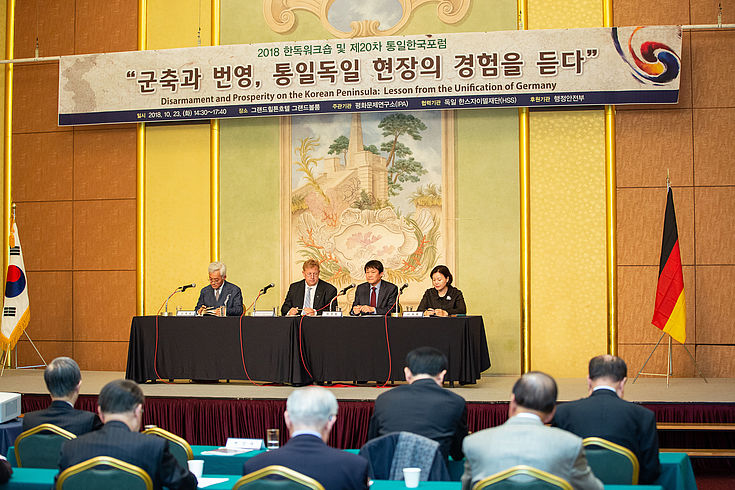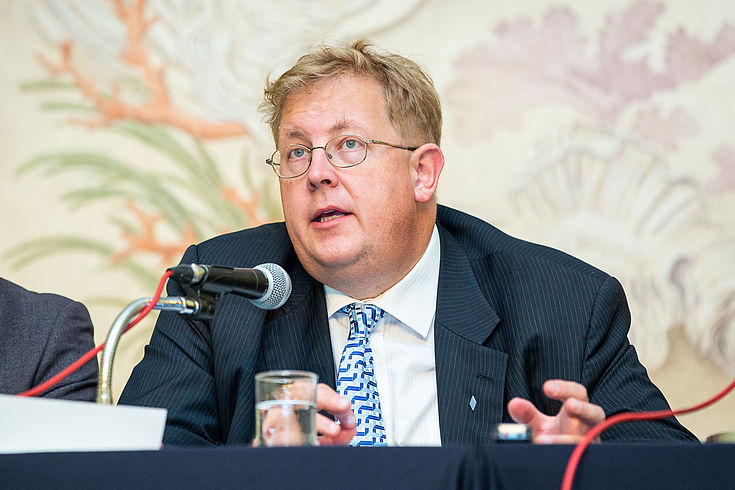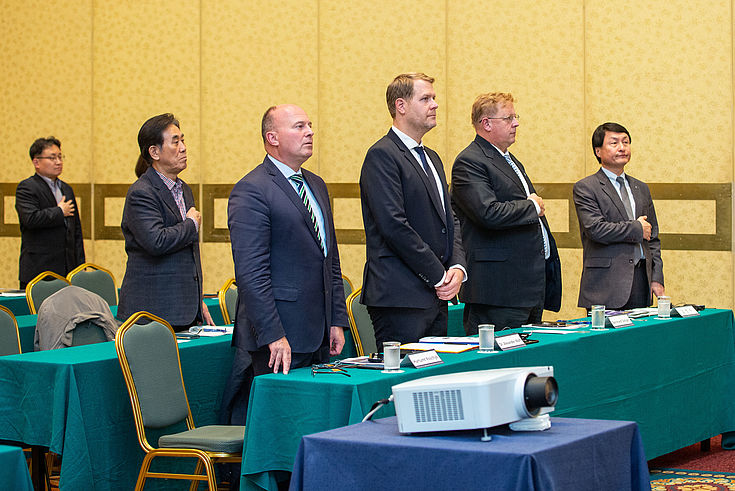Tongil Hankuk Forum
Germans and Koreans working for Peace
German-Korean Workshop 2018 and 20th Tongil Hankuk Forum in Seoul
HSS
On October 22, 2018, the German-Korean Workshop of the Institute for Peace Affairs and the Hanns-Seidel-Foundation took place in Seoul in conjunction with the 20th Tongil-Hankuk Forum. The workshop aimed at experts from research, universities and administration was opened by Son Jae-Shik, former reunification minister and president of the Tongil-Hankuk Forum. After an opening speech by Dr. Bernhard Seliger of the Hanns Seidel Foundation, the former Minister of Reunification Hyun In-Taek and Hartmut Koschyk, who is the Co-Chairman of the German-Korean Forum and a leading actor in the German-South Korean as well as in the German-North Korean dialogue for years, gave their welcoming remarks. The topics covered were the current situation on the Korean peninsula and the possibilities for a new policy of détente. In his opening speech, Dr. Seliger advocated to not be naïve, instead to courageously seize the opportunities for a better future on the Korean peninsula. Hartmut Koschyk referred to his first trip to North Korea with the Institute for Peace Affairs to the newly opened mountains of Kumgangsan in North Korea, where the discussions of North and South Koreans had convinced him that he would still experience the Korean reunification.
Dr. Bernhard Seliger advocated to not be naïve, instead to courageously seize the opportunities for a better future on the Korean peninsula
HSS
The first session dealt with the development and dissolution of the National People's Army of the German Democratic Republic (GDR) in the course of reunification and possible lessons for Korea. In this session, which was chaired by Prof. Park Chang-hi of the National Defense University of Korea, Rainer Eppelmann, chairman of the Federal Foundation for reprocessing the SED Dictatorship and previous Minister of Defense and Disarmament of the GDR, was supposed to speak about his experiences. As he was unable to come and give a lecture at the last minute due to a pilot strike, Dr. Seliger of the HSF stand in for holding a presentation. Although the danger of a "Chinese solution", i.e. a repression of the democracy movement, was certainly present in the GDR in 1989, the political dependence of the NVA, the paralysis of the SED under the ill Erich Honecker and the frustration and lack of motivation within the NVA made it appear as a purely passive institution. Without a single military conflict, democratization was achieved and later the NVA was peacefully dissolved. Prof. Kim Dong-Yeob, professor at Kyungnam University - Institute for Far Eastern Studies, was impressed by the simultaneous process of democratization, reunification and reduction of the total army’s strength from almost 600,000 after reunification to only 170,000 soldiers today. Dr. Lee Ho-Ryong of the Korean Defense Research Institute referred to the German experience with confidence-building on both sides, e.g. in the framework of the Helsinki Accords, which is lacking in Korea.
From the left: Hartmut Koschyk, Dr. Alexander Wolf, Dr. Bernhard Seliger and Youngsoo Kim
HSS
The second session dealt with the changes in Germany during the "Berlin Republic". The focus on Berlin was ideally covered by Dr. Alexander Wolf, Head of the Berlin Representative Office of the Hanns Seidel Foundation, who described the economic, political and social changes in Berlin after reunification. In the ensuing discussion conducted by Prof. Yoon In-Jeon from Korea University, Prof. Im Hyeong-baek from Seongkeol University and Dr. Park Hi-jin from Donkuk University talked about the example of Berlin and the situation in North Korea. According to Prof. Im, the gap between Pyongyang, a rich city, and the rest of the country is huge and continuously growing. Berlin, on the other hand, perceives itself to be "poor but sexy", as it was put into words by one of its representatives. Achieving balanced regional development, with a positive contribution by the capital but no dominance, is a major challenge, in Germany as in Korea.
The Institute for Peace Affairs is the main partner of the Hanns Seidel Foundation in Korea in matters of reunification. Every year, for the German-Korean workshop German experts come to Korea to discuss developments in the reunited Germany. The Tongil-Hankuk Forum brings together many former and current decision-makers on issues of Korean reunification.



